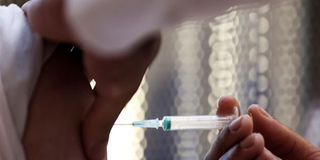Build trust in communities on vaccination campaigns

A health worker administers a vaccine recently. PHOTO/ FILE
What you need to know:
The issue: Vaccination
Our view: Efforts must be geared towards fighting vaccine hesitancy, the reluctance or refusal to vaccinate, flagged by the WHO as one leading threat to global health
At least 157 children have been killed in Zimbabwe following a measles outbreak with more than 2,000 infections reported across the country.
The grim report should serve as a reminder for the government and the population in Uganda. We cannot afford to let our guard down. There is a high price to pay for complacency on vaccination.
The Zimbabwean government has blamed apostolic church sects for the surge in infections given measles was largely prevalent among those who had not received vaccinations.
Like in Zimbabwe, Uganda also has so many of these groups and individuals who have rejected vaccines. Uganda is currently battling a low uptake of Covid-19 vaccines for which the country may pay dearly in the future.
Outbreaks of diseases, which can easily be prevented with vaccines, strain the health sector which is grossly underfunded due to limited resources. It diverts focus and effort from fighting other diseases. In August 2021, the Health Ministry declared an outbreak of polio, a viral disease that is transmitted from person to person, following confirmation of laboratory tests from samples in Kampala.
A year earlier, in August 2020, Uganda and the entire Africa had been certified by the World Health Organisation (WHO) as wild poliovirus free.
Credit to the authorities, especially the Health Ministry and its partners, Uganda promptly carried out a nationwide polio campaign to immunise all children below the age of five. At the end of the exercise 95 percent of the 8.7 million children under five years had been immunised against type 2 polio. The outbreak is a reminder of the ever present danger of these diseases.
The WHO has highlighted the importance of routine immunisations for diseases such as measles, tetanus and polio. Immunisation saves millions of lives each year and that is why Uganda must ensure that vaccine coverage is high. Uganda should continue to contribute to the progress to bring down the number of unvaccinated and under-vaccinated children in Africa given that nearly half of the world’s population lives on the continent.
Efforts must be geared towards fighting vaccine hesitancy, the reluctance or refusal to vaccinate, flagged by the WHO as one leading threat to global health.
There is an urgent need to recognise the importance of mistrust in vaccination campaigns. Research has shown that immunisation is one of the most cost-effective public health interventions. The WHO estimates that vaccination prevents 2-3 million deaths each year. There is an urgent need to recognise the importance of mistrust in vaccination campaigns.
As we counter the myths about vaccines and raise awareness, we urge the authorities to build trust in communities receiving the vaccines through recognising people’s concerns and then providing reliable information from credible sources, using terms that are not confusing or too technical recognising people’s concerns and then providing reliable information from credible sources, using terms that are not confusing or too technical.
Our commitment to you
We pledge:
- To be accurate and fair in all we do.
- To be respectful to all in our pursuit of the truth.
- To refuse to accept any compensation beyond that provided by Monitor Publications Ltd. for what we do in our news gathering and decision-making.
Further, we ask that we be informed whenever you feel that we have fallen short in our attempt to keep these commitments.




